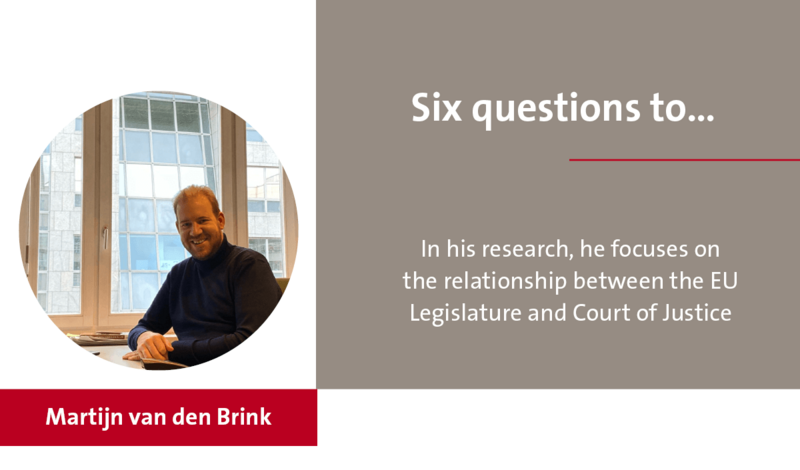
Martijn van den Brink discovered his interest in the EU and EU law mostly by chance during his time at university, but he has been working on EU issues ever since. His current research is focused on the EU Legislature, the Court of Justice, EU citizenship, and religious discrimination.
In our series "Six questions to...", we introduce the PhD students and Postdoctoral Researchers at the Jacques Delors Centre and their research projects and thoughts on the European Union. Martijn van den Brink is a Postdoctoral Researcher and the Research Coordinator at the Jacques Delors Centre.
1. What is the main focus of your research in one sentence?
My current research focuses mainly on the proper relationship between the EU Legislature and Court of Justice. I also occasionally write about EU citizenship and religious discrimination.
2. How did you end up working on the EU?
Mostly by chance. I didn’t really have a clear idea of what I wanted to study after high school and enrolled in an international relations degree because it sounded interesting. A year later I also took up a law degree. I disliked most of my Dutch law classes and many of the international relations courses didn’t interest me then (the latter has changed over the years). But I really enjoyed the EU law and EU politics classes I took, and I’ve been working on EU issues ever since.
3. In your opinion, what is the most important issue the EU needs to solve?
It’s probably not very original to say that the democratic and rule of law backsliding and the miserable treatment of migrants at the EU’s borders are important issues that need to be addressed. But it’s hard not to mention them. It would also be great if the EU would become a more significant player in the fight against climate change. One issue that I find increasingly annoying about the EU is that it promises a lot that it can’t deliver. There’s often a lot of talk from Brussels, but not always enough action (of course, not always through fault of its own).
4. What is your favourite place in Berlin to relax after an intense work day?
I only recently started my job and don’t live in Berlin (unfortunately), so can’t say that I have a favourite place to relax here after a day of work. Fortunately, I have some good friends here, and it’s always nice to get to explore with them and get to know different parts of town, but very often I spent the hours after a day of work on the train back home. And while I really appreciate the German railway system, Deutsche Bahn doesn’t always provide the most relaxing environment.
5. What is the research question you would really like to answer one day?
That is a really good question; one that I hope to answer in the coming months as I try to develop a project that can keep me busy for the next few years. So stay tuned!
6. How would you explain the EU to an alien?
Jacques Delors once called the EU an Unidentified Political Object, an entity that is hard to describe and explain to the public. While not everyone will agree on that description, it seems fair to say that the EU is certainly not always a flying object. Not all of its projects and ideals get off the ground, and those that do sometimes face a hard landing. Still, for all its imperfections, the EU has accomplished many good things over the years, providing numerous opportunities for many of its citizens, improving relations among its member states, and contributing to addressing regional problems that might otherwise have gone unsolved.
